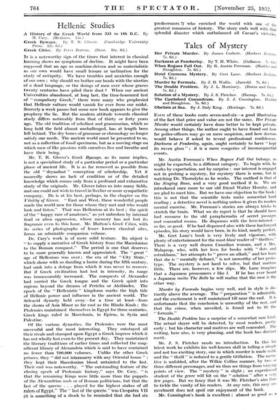Hellenic Studies
A History of the Greek World from 323 to 146 B.C. By M. Cary. (Methuen. 158.)
Greek Cities. By Peter Hutton. (Dent. 10s. ad.)
IT is a noteworthy sign of the times that interest in classical learning shows no symptoms of decline. It might have been supposed that an age so machine-driven and so materialistic as our own would have small leisure or inclination for the study of antiquity. We have troubles and anxieties enough of our own ; why should we bother our heads with the niceties of a dead language, or the doings of men over whose graves twenty centuries have piled their dust ? When our ancient Universities abandoned, at long last, the time-honoured test of "compulsory Greek," there were many who prophesied that Hellenic culture would vanish for ever from our midst. Scarcely a week passes but some new book appears to give the prophecy the lie. But the modern attitude towards classical study differs noticeably from that of thirty or forty years ago. The old tradition of scholiast and grammarian, which so long held the field almost unchallenged, has at length been left behind. The dry bones of grammar or chronology no longer satisfy our needs. The ancient world must be presented to us, not as a collection of fossil specimens, but as a moving stage on which men of like passions with ourselves live and breathe and have their being.
Mr. T. R. Glover's Greek Byways, as its name implies, is not a specialized study of a particular period or a particular phase of ancient life. It is as far removed as possible from the old " dryasdust " conception of scholarship. Yet it assuredly shows no lack of erudition or of the detailed knowledge which comes only from a profound and exhaustive study of the originals. Mr. Glover takes us into many fields, and one could not wish to travel in livelier or more sympathetic company. He is at his best, perhaps, in the chapter on the Vitality of Greece. "East and West, these wonderful people made the world new for those whom they met and who would look and listen." That was Hellenism at its best ; the spirit of the "happy race of amateurs," as yet unbroken by internal feud or alien oppression, whose memory has not lost its fragrance even to this hour. Mr. Hutton's Greek Cities, with its series of photographs of lesser known classical sites, forms an admirable companion volume.
Dr. Cazy's work is of more solid texture. Its object is "to supply a narrative of Greek history from the Macedonian to the Roman conquest." The period is one that deserves to be more generally known and appreciated. The " great " age of Hellenism was over ; the era of the "City State," which shone with so dazzling a lustre during the fifth century, had sunk into a dotage from which it was never to recover. But if Greek civilization had lost in intensity, its range was immeasurably increased. The conquests of Alexander had carried the Greek tongue and the Greek spirit into regions beyond the dreams of Pericles or Alcibiades. The epoch of the " Hellenistic " kingdoms marks the high tide of Hellenic power and influence in the ancient world. The Seleucid dynasty held sway—for a time at least—from the shores of Asia Minor as far east as the Hindu Kush ; the Ptolemies maintained themselves in Egypt for three centuries. Greek kings ruled in Macedonia, in Epirus, in Syria and Palestine.
Of the various dynasties, the Ptolemies were the most successful and the most interesting. They outstayed all their rivals and stamped upon Egypt a Greek impress which it has not wholly lost even to the present day. They maintained the literary traditions of earlier times and collected the mag- nificent library of Alexandria which is said to have contained no fewer than 700,000 volumes. Unlike the other Greek princes, they "did not intermarry with any Oriental house " ; they kept their Macedonian blood untainted to the last. Their end was noteworthy. "The outstanding feature of the closing epoch of Ptolemaic history," says Dr. Cary, "is that the remaining Kings were little more than the puppets of the Alexandrian mob or of Roman politicians, but that the last of the queens . . . played for the highest stakes of all rulers of Egypt." The "last of the queens "was Cleopatra VII (it is something of a shock to be reminded that she had six predecessors t.) Who enriched the world with one of the greatest romances of history. The story ends well with that splendid disaster which outbalanced all Caesar's victories.






































 Previous page
Previous page